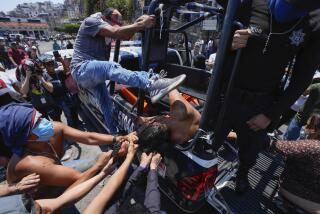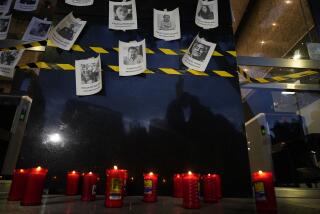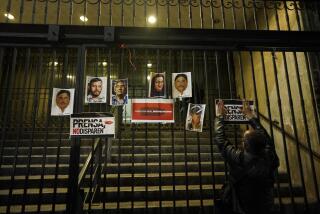Argentine singer killed in Guatemala ambush
Reporting from San Salvador and Mexico City -- Argentine songwriter and singer Facundo Cabral, an icon of Latin American folk and protest music, was shot to death early Saturday by unknown gunmen who intercepted his car in Guatemala City and pumped it full of bullets.
Guatemalan authorities said they had not yet determined a motive for the slaying, which appeared to be a well-orchestrated ambush, and there were suggestions that a businessman accompanying Cabral might have been the intended target. Guatemala has one of the highest murder rates in the region, exacerbated in recent years by the invasion of Mexican drug traffickers.
“Facundo Cabral was an idol for entire nations, and his death damages not only Guatemala but the entire world,” Guatemalan human rights prosecutor Sergio Morales said.
Photos: Singer slain in Guatemala
Cabral, 74, had spent a week in Guatemala giving concerts, and around dawn Saturday was en route to the capital city’s airport when his two-vehicle convoy was blocked by three carloads of gunmen. They fired more than 25 shots, a government spokesman said, and Cabral died at the scene.
Bodyguards in the car accompanying Cabral’s returned fire but were not able to repel the attack, authorities said.
Guatemalan President Alvaro Colom expressed outrage at the “cowardly attack” and promised to bring the killers to justice. He telephoned Argentine President Cristina Fernandez de Kirchner to offer condolences and invited Argentine authorities to join the investigation.
Colom, in a later news conference, blamed the slaying on “organized crime.”
“They were not killers off the street,” he said. “It is a well-planned operation by organized crime.”
Interior Minister Carlos Menocal, who joined Colom at the news conference, said “everything indicates” that the intended victim may have been Cabral’s concert promoter Henry Farina, a Nicaraguan, who was driving the car. Menocal cited bullet patterns and other evidence that he did not specify, and he noted that Cabral’s decision to ride to the airport with Farina was made at the last minute.
Farina, who also owns a string of nightclubs in Central America and Colombia, was wounded in the attack.
“Obviously we will be talking to him,” Menocal said.
Guatemala, which holds presidential elections in two months, is awash in violence. The country on Mexico’s southern border has become a major center for narcotics trafficking, and cartels have increasingly overpowered local authorities and seized control of Guatemalan territory.
Cabral, born to a dirt-poor family in provincial Argentina, rose to fame in the 1970s primarily as a writer and performer of protest songs, at a time when Latin America was shackled by military dictatorships, coups and crises. He went into exile in Mexico during Argentina’s military junta from 1976 to 1983. Later, his songs became more spiritual and philosophical, and he never seemed to tire of giving concerts, despite a number of physical frailties, including eye disease.
In 1996 UNESCO named him an “international messenger of peace,” and themes of peace and brotherhood dominated his later work. His most famous song, adapted by many artists, was the 1970 tune “No Soy de Aqui, Ni Soy de Alla,” (“I’m Not From Here, I’m Not From There Either”).
His death sent sorrow and shock across Latin America.
“I cannot believe it,” another Latin music star, Ricardo Montaner, said in a Twitter message. “All artists on the planet are in mourning.”
The presidents of Colombia, Ecuador and Venezuela expressed sorrow for the loss of what Venezuela President Hugo Chavez’s Twitter site called “the great troubadour of the Pampas.” Argentine Foreign Minister Hector Timerman tweeted his “profound sadness,” adding, “Adios, amigo.”
Guatemala’s Nobel laureate, Rigoberta Menchu, went to the site of the killing and wept as she spoke to television reporters. “He was a master,” she said. “I can’t help but think he was killed for his ideals, because why else would he be killed here in Guatemala. He loved Guatemala.”
In an interview with the Guatemalan newspaper Prensa Libre in 2009, Cabral spoke of finally slowing down and of giving a series of farewell concerts. He was asked what his final message would be.
“That life is a precious gift,” he said. “That we are born to live, and we can only live in love.”
Photos: Singer slain in Guatemala
Los Angeles Times staff writer Wilkinson reported from Mexico City and special correspondent Renderos from San Salvador.
More to Read
Start your day right
Sign up for Essential California for news, features and recommendations from the L.A. Times and beyond in your inbox six days a week.
You may occasionally receive promotional content from the Los Angeles Times.





















































